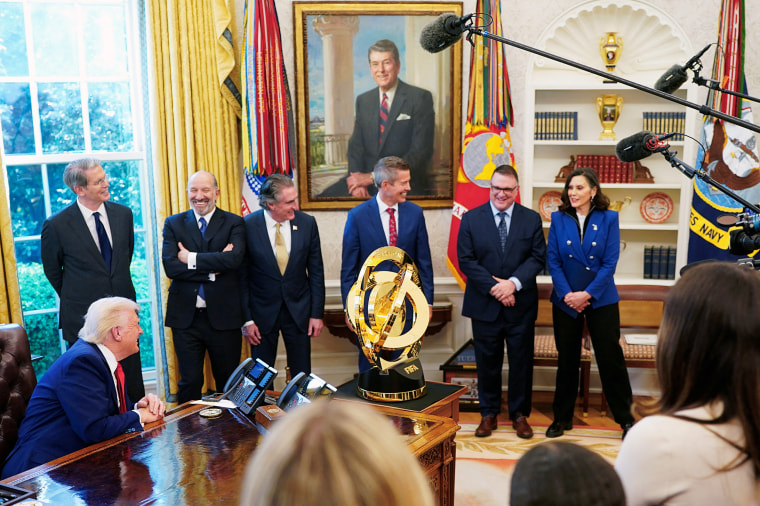
LANSING, Mich. — As she spoke Friday night in the high school gymnasium where Magic Johnson starred as a prep basketball player, Sen. Elissa Slotkin, D-Mich., reached for a football analogy while wrestling with the existential questions facing the Democratic Party.
“We know the Lions are going to the Super Bowl this year because they have a good defense and a good offense, right?” Slotkin, referring to Detroit’s NFL team, told an audience of roughly 400 people at a town hall forum.
“So we have to be able to do both,” Slotkin added. “We have a strong defense, but then you’ve got to have a vision, an alternative vision, to what is being provided to us every day. And that is the charge of the next generation of leaders in the Democratic Party.”
Slotkin narrowly won her Senate seat last year, prevailing in a competitive state that backed Donald Trump for president. Almost instantly, given her against-the-current victory and Midwest perch, Slotkin became a go-to voice for a party struggling with its identity. She delivered the Democratic response to Trump’s joint address to Congress in March.
She also has thrown herself into advocating for a robust takedown of the president’s agenda.
“I wrote a war plan,” the former CIA analyst and Pentagon aide told her audience here last week, “of how to contain and defeat Trump — a 17-page PowerPoint.”
The town hall put Slotkin in her old congressional district, but the content was consistent with a message that she has been testing nationally. And by advancing her “alternative vision,” Slotkin is establishing herself as another Democratic officeholder in Michigan who could emerge as a White House contender in 2028, along with Gov. Gretchen Whitmer.
Whitmer, a subject of presidential speculation for years, remains popular with voters in a state that was placed near the front of last year’s primary calendar. Unlike Slotkin, she has taken a less confrontational approach toward Trump in his second term.
Those familiar with Slotkin’s rise stress that her Senate campaign should not be viewed as some grand plan to quickly build a higher profile and set up a run for president. But a Democratic strategist who has worked on Michigan races believes that it’s something she will at least consider.
“The way she thinks of it is, this party is on the precipice of full-on collapse,” said this person, who like others was granted anonymity to talk about a fluid situation and discuss sensitive intraparty dynamics ahead of 2028. “Circumstances have just sort of pushed her into this.”
Slotkin rolled her eyes and briskly sidestepped when asked in an interview if people have been encouraging her to consider running for president in 2028.
“I’m about to go out in front of 1,000 people who think that they’re going to lose their health care,” she told NBC News before her town hall at Everett High School. “I am focused on, literally, saving them from losing their health care and their food. And I get it. I know it’s a good parlor conversation. It’s just, honest to God, not where my head is focused right now. It’s just not.”
Whitmer’s way
Whitmer was a finalist to be Joe Biden’s vice presidential running mate in 2020, having positioned herself at the time as a prominent foil for Trump and a critic of his pandemic management. Whitmer also was on a short list of Democratic governors and senators who were seen as potential replacements for Biden on the ticket last year before then-Vice President Kamala Harris sewed up the nomination.
Spokespeople for Whitmer did not respond to requests to interview the governor for this article. Two Democratic operatives who have worked with her said it is unclear to them what her intentions are for 2028 and would not be surprised if she were to pass on a run.
“I think it’s a huge open question,” one of the operatives said. “What people who don’t know her miss is that she’s a super-regular person who likes hanging out at the lake and drinking beer and hanging out with her dogs and husband.”
Although the term-limited Whitmer has not made definitive plans, many of her recent moves as governor have been viewed through the prism of national politics. She has made public overtures to Trump, meeting with him at the White House and working with him on issues important to Michigan.
Whitmer’s way has been rewarded on one level. Trump announced a new fighter jet mission for an endangered air base in her state and committed his administration’s support to combat Asian carp, a Great Lakes nuisance. On the latter issue, the White House even took a shot at Democratic Illinois Gov. JB Pritzker, a potential Whitmer primary rival in 2028 whom the Trump administration characterized as a hindrance to mitigating the ecological impact of the invasive fish.

But Whitmer’s courtship also has put her crosswise with other Democrats who find her too accommodating of Trump. After one of her White House meetings in April, Whitmer joined Trump for a photo opportunity in the Oval Office, where the president announced investigations of two political adversaries and repeated his debunked claim that the 2020 election was stolen from him. Adding to Whitmer’s political troubles that day was a New York Times photographer who documented the governor — who later acknowledged she did not want her picture taken there — hiding her face behind blue folders.
Whitmer’s team has taken comfort in internal and independent polling since then that has shown that a majority of Michigan voters approve of her job performance as governor.
“From her perspective, I think it’s, ‘I’m going to do as good a job as I can for the people in my state, and the political benefits will follow,’ as opposed to others who are taking different approaches by showing up in New Hampshire and South Carolina,” two states typically at the front of the primary calendar, said another operative who has worked with Whitmer. “Are they as focused on their states as they should be? Will they have a set of accomplishments?”
In a presidential primary debate, this person added, “all she has to do is throw in a couple of places where she’s held Trump’s feet to the fire and stood up to him. Yeah, she took some s—, but she’s positioned herself well to make a pretty compelling argument that she got some really important stuff for her state that at the end of the day made her a great governor.”
Michigan Democratic Party Chairman Curtis Hertel, who served in the Legislature during Whitmer’s first term as governor, praised her for working across the aisle but also for championing new gun-safety laws and a repeal of the state’s anti-union “right-to-work” law.
“Too often we find labels and differences in places where there aren’t,” Hertel said in an interview. “It’s incredibly important that we’re pushing back and fighting back and all those things. That doesn’t mean there aren’t places of agreement where we can work with each other. That’s part of being a successful public servant. … So I don’t think it’s a binary choice, and I think that our leaders in Michigan understand that, and I think that’s how they’re behaving.”
Slotkin calling ‘balls and strikes’
Slotkin has used her bully pulpit as a newly elected senator to push back on Trump more.
“I think for me,” she said in the interview, reaching for another sports metaphor, “it’s just call balls and strikes on what he’s proposing and what it’s going to do to your business, your life, your family. You don’t have to overhype what’s happening, but don’t underhype it, either.”
Slotkin also has a calling card Whitmer doesn’t: She has twice won tough elections — her first House re-election bid in 2020, and last year’s Senate race — with Trump on the top of the ticket. (A third Michigan Democrat who could run in 2028, former Transportation Secretary Pete Buttigieg, lives in the state but has never won an election there and is associated more with Indiana, where he was the mayor of South Bend.)

“Gretchen,” said the strategist who has worked on Michigan races, “has only had to run statewide in two cycles good for Democrats, and never on the ballot the same year as Trump. It’s a completely different dynamic.”
One of the operatives who has worked with Whitmer characterized the differences between her and Slotkin as minor nuances.
“The No. 1 similarity, which is probably more important than all of those smaller discrepancies, is that they’re tough women,” this person added.
During Friday’s town hall, during which members of a heavily Democratic audience read aloud questions they had submitted in advance, Slotkin shared a stage with Hertel and Rep. Kristen McDonald Rivet, who won her seat last year in a competitive, neighboring district. Slotkin’s old district, now represented by Republican Tom Barrett, is the type of place where they are hoping to rally discouraged Democrats.
Questions ranged from concerns about spending cuts and Trump’s massive domestic policy bill to a fear that the president could declare martial law to postpone future elections — an unsubstantiated theory percolating on the political left. Slotkin validated their worries with calls to action.
“The president has made comments that are real close to martial law,” she said. “He’s talked about sending the National Guard into our cities. We need to listen when he says things.”
The next day, Trump deployed the National Guard to the Los Angeles area to counter protests against immigration raids, ignoring the wishes of California Gov. Gavin Newsom, a Democrat.
Slotkin also pressed the audience to engage Republicans, noting how she invited her township supervisor, a Republican, to join her at Trump’s inauguration in January.
“We’ve got to have these conversations, not just with them, but with those folks who just kind of can’t stand politics either way,” Slotkin said. “It’s hard to like politics right now. Most of you probably don’t like it. You just do it because you love your country.”
 Latest World Breaking News Online News Portal
Latest World Breaking News Online News Portal






